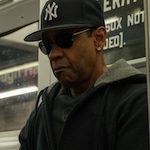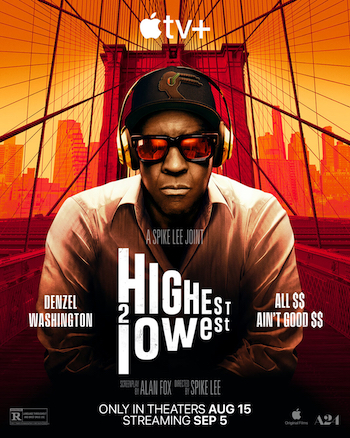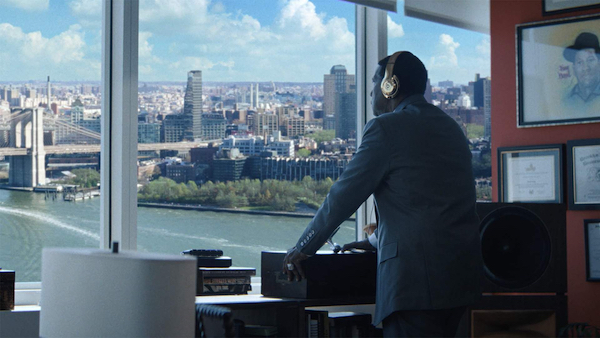 I’ve been watching Spike Lee movies since I was a teenager in the late ’80s. Okay, I still haven’t seen SHE HATE ME, but otherwise I see all of them, and any new one is obviously gonna be an event for me. They’re pretty infrequent these days, though – it’s been five years since his last movie (DA 5 BLOODS), seven since his last theatrical release (BLACKKKLANSMAN). So I’m thankful that even though it was made for Apple TV+ the new one is playing at my favorite theater, SIFF Downtown, f/k/a Cinerama.
I’ve been watching Spike Lee movies since I was a teenager in the late ’80s. Okay, I still haven’t seen SHE HATE ME, but otherwise I see all of them, and any new one is obviously gonna be an event for me. They’re pretty infrequent these days, though – it’s been five years since his last movie (DA 5 BLOODS), seven since his last theatrical release (BLACKKKLANSMAN). So I’m thankful that even though it was made for Apple TV+ the new one is playing at my favorite theater, SIFF Downtown, f/k/a Cinerama.
HIGHEST 2 LOWEST is, yes, a remake of Akira Kurosawa’s HIGH AND LOW (1963), itself based on the Ed McBain 87th Precinct Mystery King’s Ransom (1959). So that means it tells the story of an executive dealing with a kidnapping/ransom situation while also trying to take over control of his company. Instead of the shoe industry this time it’s the music industry, and instead of the guy who runs the factories he’s a Grammy winning, cover of Rolling Stone, “best ear in the business” producer/label owner/icon. Denzel Washington (RICOCHET) plays David King, founder of Stackin’ Hits Records, obviously.
To the chagrin of his supportive wife Pam (Ilfenesh Hadera, OLDBOY, CHI-RAQ, THE BRICKLAYER, WEREWOLVES) and fellow share holder Patrick (Michael Potts, MA RAINEY’S BLACK BOTTOM, RUSTIN, voice of Cyrus in the video game based on THE WARRIORS), David is scheming to buy back a controlling interest in his company before it’s taken over by rival Stray Dog Records (get it?) and, he says, replaced with A.I. or something? It seems like a fantasy these days, a businessman who chooses art and culture over a payout – in he fact makes complicated and risky financial maneuvers to keep control of his catalog and artists even though it barely breaks even. Good for you, David King. If only you were real.
 As in HIGH AND LOW, these dealings take up quite a bit of screen time before it turns into a crime movie, but here it doesn’t feel like it’s burning enough to be a slow burn. Honestly it kinda feels like the tv show Empire if it were a very staid Kurosawa tribute made by earnest squares instead of a preposterous soap opera made by weirdos. When David finally gets a call from someone saying they have his basketball phenom son Trey (Aubrey Joseph, RUN ALL NIGHT), the melodramatic wailing of the score by Howard Drossin (THE MAN WITH THE IRON FISTS 2) borders on comical.
As in HIGH AND LOW, these dealings take up quite a bit of screen time before it turns into a crime movie, but here it doesn’t feel like it’s burning enough to be a slow burn. Honestly it kinda feels like the tv show Empire if it were a very staid Kurosawa tribute made by earnest squares instead of a preposterous soap opera made by weirdos. When David finally gets a call from someone saying they have his basketball phenom son Trey (Aubrey Joseph, RUN ALL NIGHT), the melodramatic wailing of the score by Howard Drossin (THE MAN WITH THE IRON FISTS 2) borders on comical.
(Not that this is an overly serious movie. Like most Spike Lee joints it has some laughs, and there are even a couple weird meta/in-jokes – a star of DO THE RIGHT THING cameoing as herself, an apartment numbered after one of the production companies, a joke about the advertising mascot played by one of the cast members, that very obvious Kurosawa reference I mentioned.)
Eventually they find Trey and learn that the kidnappers actually have his best friend Kyle (Elijah Wright, Godfather of Harlem), who is the son of David’s driver Paul (Jeffrey Wright, THE INVASION). I think there’s a big difference from the Kurosawa version here because Paul is not just the help – he seems to be David’s right hand man, advisor, best friend, and basically family. David tells Paul about his plans to take over Stackin’ Hits before he even tells Pam, Trey calls him Uncle Paul, and David is Kyle’s godfather, for God’s sake. So it seems more crazy than satirical when David initially refuses to pay the ransom he was gonna pay for his own kid (and debates whether or not letting Kyle die would cause him to be “cancelled”). Later, when the story moves from the King family penthouse to the city below it’s a vibrant New York City, if not a wealthy one. So the class dynamic that’s right there in the title is not really the same; there’s not as much emphasis on how different the low is from the high.
Though the screenplay is credited to a little-known writer named Alan Fox, it has clearly been rewritten to include many Spike Lee concerns – references to HBUs, Black music icons and basketball rivalries. The King family home is decorated with portraits of iconic Black singers (James, Stevie, Aretha), classic hip hop album covers (Illmatic, Tougher Than Leather, Return of the Boom Bap), and paintings by Black artists (I recognized Basquiat and Kehinde Wiley) which are reportedly reproductions of ones in Lee’s own collection. It made me think of Jay-Z, a real artist who grew into a very successful businessman and is big on owning Basquiats and shit. While I understand their goal of making generational wealth not just a white thing and admire their taste in opulence I still can’t really be that excited about looking at all their shit. David is up on high and maybe the low is us watching his property on screen, or the other characters watching it on Instagram.
There’s far less investigation than in HIGH AND LOW – we do see the kidnapper watching the apartment from below, but there’s nothing about narrowing down the parts of town it can be seen from. Like the King penthouse, the method David uses to find the kidnapper can be spotted from a distance, but I still think it’s a cool idea and exciting when it finally happens.
Despite how long I’ve been hearing his name I really have no familiarity with the rapper A$AP Rocky (a.k.a. Rakim Mayers), who has a major role in this. I don’t think it’s much of a spoiler to say that he plays the kidnapper, but maybe it is a spoiler to say his character is an unsigned rapper who calls himself Yung Felon. He’s an interesting mirror to David because both are making audacious, desperate moves to get what they want, but Yung Felon is trying to start a career and David is trying to bring his to a more fulfilling final phase. This character also brings together other themes of the movie because he idolizes David and knows all about his family from their social media channels.
Someone asked me where this ranks with the other Denzel-Spike movies (MO’ BETTER BLUES, MALCOLM X, HE GOT GAME, INSIDE MAN) – I mean, I gotta say it’s at the bottom. Maybe you could argue it’s better than INSIDE MAN on the basis of having a higher ratio of idiosyncratic Spike Lee business to regular mainstream movie stuff, but INSIDE MAN just works better as a thriller. This one has a long stretch that really had me thinking well, it was good while it lasted, Spike has obviously lost his touch but I will try to appreciate it on its own terms.
For maybe half of it it seems like we’re watching Kickstarter Spike Lee – and not the “I’m self-funded so I’m gonna do even weirder shit” part of that, just the “I’m on a budget so it’s not gonna look as cinematic as my other movies” part. Of course by design the first section takes place all in the same apartment, but there’s kind of a brightly lit soap opera type of look to it, and I’m genuinely not sure if some of the balcony shots are green screen or just a look I don’t like. Some of the scenes feel oddly slow and stodgy for Lee. The silver lining is that it leaves room for us to pay more attention than usual to the weird Denzel energy – rubbing his hands together, clapping, doing shtick with a microphone shaped award trophy, whatever. It’s always there but it stands out more here than in, like, THE EQUALIZER 3.
Eventually, thankfully, he blossoms into Old Master Spike Lee, and/or good old Playful Spike Lee. When out of the blue there was a wipe using an on screen graphic I did not yet recognize as the Stackin’ Hits logo my eyebrows were raised. And when the cops were going over the plan and there were insert shots of the signs for each subway stop mentioned I thought “There you are, Spike.” The montage maniac side of him takes surprisingly long to get revved up in this one. Then he switches to handheld and starts shooting some of it on film. I mean the cinematographer is Matthew Libatique (PI, A STAR IS BORN, BIRDS OF PREY), might as well let him make it look good. There’s a thrilling sequence involving the hand-off of the ransom money where it feels crazy that this is the same movie we’ve been watching the whole time. Where was this Spike Lee earlier? Lying in wait I guess.
The other thing about that clunky first half is I really thought it was showing Spike had turned into an old man, lecturing the youth. Happens to the best of us. There’s a scene where David interrogates/lectures Trey about being on his phone and worrying about “followers” too much and it makes perfect sense in the story but it goes on long enough to feel like oh, this is just a rant that Spike wanted to make. But he doesn’t depict Trey as some know-nothing kid. He gives him an Ali-Frasier in Zaire framed poster in his bedroom and a shirt printed with Basquiat art. And I think we find out that Trey knows what he’s doing. With all his networking he meets a singer who (spoiler?) profoundly moves his father. And this made me think about how for the soundtrack of DA SWEET BLOOD OF JESUS Lee put out a call for music from unsigned artists on Instagram, Twitter and Facebook, listened to over 800 submissions and chose 12 of them. He might actually be more Trey than David, or at least he stays in touch with young people through teaching classes at NYU.
But there’s obviously something autobiographical in David’s disagreement with Yung Felon, who is more concerned with his music making money than having integrity. I like how David doesn’t immediately dismiss his artistry, even seems to try to encourage him. When the movie really started ripping was when I started thinking he might try to save Yung Felon rather than defeat him, offer him a record contract in exchange for the money. It seemed like he was considering it, anyway.
When you think about it which one of these guys is gonna have more to say in his music? This guy?

It is weird that a movie partly about protecting the legacy of Black music has an intentionally old-timey orchestral score by a white dude. Okay, so Drossin did the orchestration for Terence Blanchard on seven previous Lee projects and was RZA’s collaborator for BLADE: TRINITY, THE PROTECTOR, THE MAN WITH THE IRON FISTS, and Afro Samurai. He’s approved. So the weird thing isn’t Drossin as much as what Lee asks him to do – I think he’s channeling how he used Aaron Copland music in HE GOT GAME, but that was interspersed with an entire album of new Public Enemy songs! I think the movie picks up when the chase overlaps with the Eddie Palmieri Salsa Orchestra performing on the street for Puerto Rico Day, and then when David’s going-to-get-shit-done scenes are scored by “The Big Payback” and “Paid the Cost to Be the Boss” (after an earlier scene where he asked a portrait of James Brown “What would you do, James?”
I’ve always said Spike Lee’s worst movies are still more interesting than most other movies. I don’t think this is his worst movie, but it’s definitely interesting. I wasn’t quite sure what to make of it as I was walking out, but a couple days later I definitely like it, and I suspect there’s much more to mine from it if I ever go back. Keep ‘em coming, Spike.
p.s. I really liked this review by Robert Daniels on RogerEbert.com


























August 25th, 2025 at 10:58 am
Yeah, sadly I have to pretty much agree with the above review. I went into this super psyched because I love HIGH AND LOW and was really curious to see how this would play out… especially intrigued that the trailer I saw 100% hid the key twist regarding exactly whose kid had been kidnapped. But… overall I’d have to say the best course of action would be to watch the trailer, think “Damn! I wonder how Lee and Washington took the dark, twisting turns and unforgettable set pieces of the original and made them their own? Could be amazing!” And then just go back and rewatch the original and leave the wonders of the remake to your imagination.